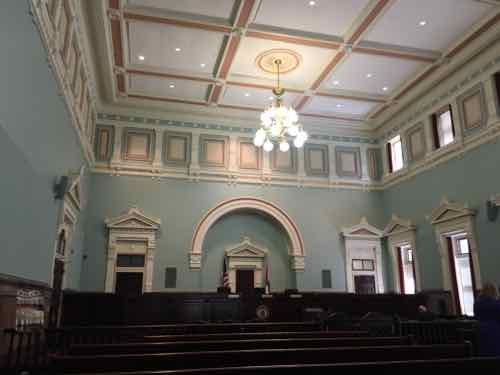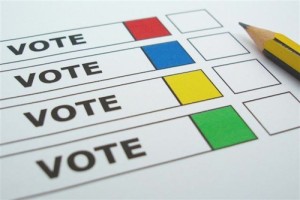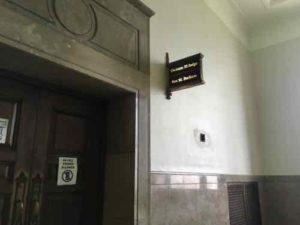Re-Vote 78th House District Today, Absentee Ballot Process, Legal Challenge In 5th Ward Democratic Committeeman Race
On Monday a 3-judge appellate court heard Penny Hubbard’s appeal to the Sept 2nd circuit court ruling that tossed out the results of the August 2nd primary in that race, ordering a special election for today. I was in the courtroom for the opening arguments in the circuit case and for the appeal earlier this week. The appeal was much quicker. Both sides had filed briefs, and each got 10 minutes to make their case to persuade to panel to affirm or reverse the original decision. Hubbard’s team also got 2 minutes for rebuttal. Done within a half an hour!

Their decision in the expedited case came out less than 24 hours later, affirming the lower court’s ruling. Today’s special election will take place. Registered voters in the 78th district need to vote today — hopefully for Bruce Franks From Tuesday’s opinion:
C. Trial Court’s Findings and Conclusions
In its Memorandum, Order and Final Judgment (“Judgment”), the trial court found the Board “disregarded” the “tedious and specific statutory process” created by the Missouri legislature and stated the statutory provisions “must be specifically followed.” Furthermore, the trial court was “firmly convinced” that the irregularities in the collection and acceptance of absentee ballots “affected the outcome of the election,” and the irregularities were more than “petty procedural infirmities” that violate election law. Although, the trial court found that the number of votes in dispute was 238, the trial court concluded that 142 of those votes, in addition to the 8 votes the parties stipulated were improperly counted, “violated Missouri law” and exceeded the apparent margin of victory (90 votes). Accordingly, the trial court held that the irregularities were of “sufficient magnitude to cast doubt on the validity of the initial election,” and it ordered the Board to conduct a “special election” for the District on Friday, September 16, 2016. Hubbard now appeals.
…
In her first point on appeal, Hubbard contends the trial court erred in ordering a new election pursuant to § 115.549, RSMo 2000 because the Board’s failure to require the use of absentee ballot envelopes for absentee voting on electronic voting systems, even if deemed an irregularity, in the absence of fraud, was not of sufficient magnitude to cast doubt on the validity of the initial election. We disagree.
…
In her brief, Hubbard argues the trial testimony showed that poll workers at the central location used ballot applications of in-person voters in lieu of the ballot envelopes and that the
difference between the two is “a distinction without a legal difference.” We disagree. Evidence at trial demonstrated the application for an absentee ballot is not notarized, does not indicate a person is signing under penalty of perjury and is not labeled as an affidavit. However, the statement on a ballot envelope is an affidavit, made under penalty of perjury, and required to be notarized unless the person is voting absentee due to their incapacity or care of another who is incapacitated. Additionally, the application does not use the statutory language from § 115.283.1 which provides, in great detail, the requirements of the ballot envelope.
…
The evidence at trial does not support the conclusion that the application’s warning that making a false statement on the application can subject the signer to criminal penalties is substantially equivalent to the voter making a sworn statement, notarized by a notary public, that they are lawfully casting their vote under Chapter 115. The intent behind each is significantly different; in applying to vote by absentee ballot, the applicant is stating they understand the penalty for making a fraudulent application is a Class One Election offense. Whereas, on an absentee ballot, the signor is making a covenant that they have lawfully cast their vote, the information included within their ballot envelope is true, and they will not cast another vote in the same election. We find there is a significant legal distinction between the voters’ notarized sworn statement on an absentee ballot envelope and their signature on the application for an absentee ballot.
Basically, the St, Louis Board of Election didn’t have the authority to permit absentee balloting in a manner different than what’s outlined in Missouri’s statutes. They’ve scrapped their secondary process and are now following the process outlined by law. If Missouri should implement a vote by mail process to replace the absentee process.
For those of us in the 5th Ward this isn’t surprising.
For weeks, debate surrounding the Aug. 2 Democratic Primary has focused on irregularities in absentee voting, some of which were featured in an Aug. 31 Post-Dispatch report. But the information gathered by the newspaper suggests that members of state Rep. Penny Hubbard’s family were seen on Election Day in or near two polling places. State law bans electioneering within 25 feet of the door of a polling place.
In one instance, Hubbard’s husband, Rodney Hubbard Sr., a candidate for Fifth Ward committeeman, parked his Mercedes in the grass a few feet from the entrance of a polling site at the Carr Square Tenant Management Corp. and watched voters come and go, two campaign workers say. (Post-Dispatch)
Just like Bruce Franks, Rasheen Aldridge won the election day voting at the polls in his race against Rodney Hubbard for 5th Ward Democratic Committeeman. Even with absentee ballots included, Aldridge won six of eight precincts in the 5th Ward — but two precincts had an overwhelming number of absentee ballots and voters for Hubbard. With Franks having successfully challenged the August 2nd primary results in court, Aldridge is raising money to do the same in his race.
Dave Roland, the attorney who represented Franks, is also legal counsel for Aldridge.
“The election between Aldridge and Rodney Hubbard Sr. was plagued by precisely the same illegalities that the courts found in Franks v. Hubbard,” Roland said Wednesday morning after filling a petition with the St. Louis Circuit Court contesting the results.
Roland said it was “indisputable” that at least 113 of the absentee votes counted in the Democratic committeeman race should not have been counted because they were cast improperly. That number includes 71 absentee ballots cast without the use of envelopes, something state law requires, as highlighted in a Post-Dispatch report. An additional 42 ballots were placed in envelopes not fully filled out. In his filing, Roland lists the names of the 113 voters he said had cast absentee ballots inappropriately. (Post Dispatch)
Please vote today (78th Dist voters) and give at least $5 to help Rasheen Aldridge get a new election in the race for 5th Ward Democratic Committeeman.
— Steve Patterson




